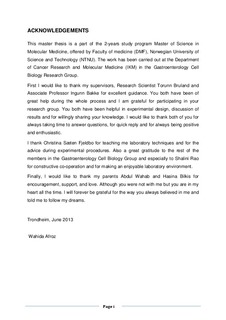| dc.description.abstract | This master's thesis is a part of a research project of The Gastroenterology Cell Biology Group investigating molecular responses to gastrin induced gene expression, with focus on how duration and intensity of gastrin signaling is translated into diverse cellular programs like survival, migration and invasion. Previous studies from extensive microarray time series experiments have revealed that the peptide hormone gastrin up-regulates genes involved in various biological process including proliferation, differentiation, migration, endoplasmic reticulum stress (ER stress), and anti-apoptosis/survival. Many of the novel gastrin induced genes are known to be stress effectors in carcinogenesis; and also ATF transcription factor subfamily proteins ATF3 and ATF4 mRNA expression levels are prolonged only in sustained gastrin treated cells. In response to different cellular stresses, phosphorylation of initiation factor eIF2α (eIF2α-p) represses global translation coincident with preferential translation of ATF4. ATF4 is known to regulate the expression of genes responsible for amino acid metabolism, cellular redox state and anti-stress responses; including several of the detected sustained gastrin induced genes involved in the balance between apoptosis and survival (e.g., Grp78 (BiP), Chop, Herpud1 and Mcl1). Because ATF4 is a common downstream target that integrates signaling from a family of at least four protein kinases that phosphorylates eIF2α, the eIF2α-p-ATF4-network is referred to as the integrated stress response
The aim of this master thesis project was to further explore gastrin induced temporal expression and cellular localization of ATF4 and its network proteins in AR42J wildtype cells and ATF4 knockdown (KD) cells. Results obtained by optimized Western blot analysis suggested that gastrin up-regulated the ATF4 protein and phosphorylated the upstream kinase eIF2α in AR42J cells. We also detected the ATF4-network proteins PERK, GCN2, CHOP and Herpud1, although the gastrin response was less clear for these proteins. Examination of intracellular localization of ATF4, GRP78 (BiP), pPERK, Herpud1 and CHOP using immunocytochemistry and fluorescence microscope confirmed that these proteins were present in both unstimulated and gastrin stimulated wild type AR42J cells. Since ATF4 regulated proteins are correlated with both apoptosis and anti-apoptosis, we investigated the anti-apoptotic effect of gastrin on serum starved wild type (wt) and ATF4 KD cells.
These results suggested that gastrin has anti-apoptotic effects in both wild type and ATF4 knockdown cells; although the anti-apoptosis effect seems even more robust in ATF4 KD cells than wild type cells, indicating that ATF4 is involved in the balance between apoptosis and survival in the gastrin response. The expression and localization of the ATF4 protein were then analyzed in oxyntic mucosa of hypergastrinemic rats; and we found that ATF4 was strongly expressed in ECL cells. Overall, the results presented suggest that ATF4 is an important transcription factor in gastrin mediated regulation of stress responses; and the eIF2α-p-ATF4-network may be involved in ECL cell hyperplasia. | nb_NO |
